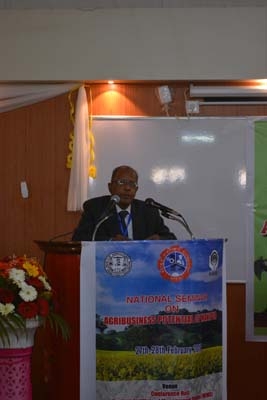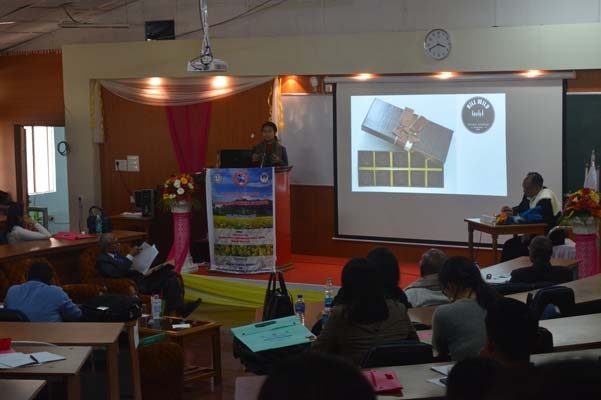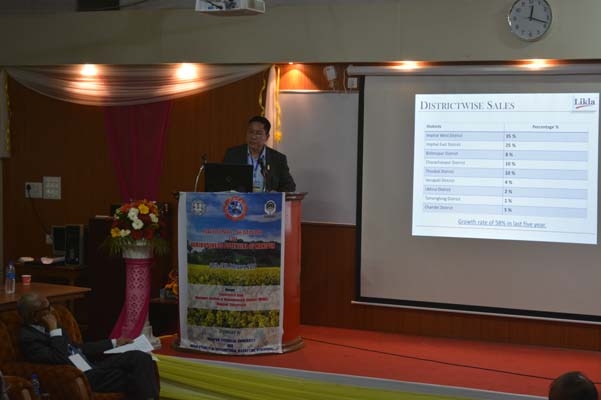Two days national seminar on “Agribusiness Potential of Manipur” was organised by Manipur Technical University and Indian Society of Agricultural Marketing (ISAM), Hyderabad on 27th- 28th February, 2019. The seminar was held at the Conference Hall of Manipur Institute of Management Studies (MIMS), Manipur University.
About the event
Manipur is predominantly a rice-growing state (80% of the cultivated area). The state is blessed with suitable Agro climatic endowments, which can support a number of horticulture and plantation crops which can give higher returns to the farmers. There are other high-value crops such as ginger, turmeric, walnut etc. Some of the commercial crops grown in Manipur are raw silk varieties such as eri, muga and tarsar, oilseeds and sugarcane which are very essential for enhancing the growth of agro-based industries in the state. Passion fruit and mushrooms have now attained special significance in the agro-economy of the state. Similarly, bamboo shoots, medicinal and aromatic plants, pineapple contribute to the farm economy. These products have thus indicated the commercial possibilities in the country where the canned products are becoming increasingly prohibit. Many vegetables such as King chilli, French bean, cucurbits, tomatoes, brinjal, bhindi, colocasia, alocasia, capsicum, broccoli, lettuce, radish are grown in the state. Many fruits such as papaya, banana, mango, jackfruit, guava, palm, lime, apricots are also grown abundantly. Over 2 lakh hectares of suitable land for horticulture crops is still left untapped. The state also has a vast potential of fisheries resources such as a pond, natural lakes, rivers, low lying paddy fields etc. The largest source of fish is the Loktak Lake. The farmers in the state perform livestock rearing with a view of sustainable development and self-efficiency in livestock products. But there is a huge gap between the demand and supply of these livestock products. In order to overcome this gap, farmer producer companies should be promoted.
Aims and Objectives
1. To understand the agribusiness potential of different crops grown in Manipur.
2. To know the present status of agribusiness in Manipur.
3. To assess the economic impact of agribusiness in Manipur.
4. Policy option to argument the economic contribution of Agri-marketing agribusiness.
5. To understand the available value addition for the crops and supply chain structures of
Manipur
Resource Persons
1. Thangjam Joykumar, Proprietor, Thangjam Agro Industries, Manipur.
2. Dr. W. Ingo, Retd. Professor and Head, Dept. of Horticulture, CAU,
Manipur.
3. Dr. Sakhen Sorokhaibam, Associate Professor, Deen Dayal, Manipur.
4. Hanjabam Subra, Proprietor, Meira Foods, Manipur.
5. Dr. Jonshon Luwang Wahengbam, Scientists, IISER, Thiruvananthapuram.
6. Dr. A. Tarajit, Associate Professor, Deen Dayal, Manipur.
7. Zeinorin Stephen, Proprietor, Hill Wild, Ukhrul, Manipur.
8. Deputy Director, Department of Sericulture, Government of Manipur.
9. Dr. Sinam Yoreitomba Meitei, MSME, Technology Centre, Imphal
Local Organising Coordinator
G. C. Sapna (Assistant Professor, Dept. of Economics, MTU)
Organisers
- Moirangthem Roshini Assistant Professor, Dept. of Management, MTU
- Yengkhom Chandrika Devi, Assistant Professor, Dept. of ECE, MTU
- Thingbaijam Rajkumari Chanu, Assistant Professor, Dept. of ECE, MTU
- Nongmaithem Sulochana Devi, Assistant Professor, Dept. of Economics, Manipur University
- Dr. K. Muktasana Singh, Post-Doctoral Fellow, Manipur University
Participants’ Feedback
Based on the papers presented and discussions, the recommendations of the seminar were framed and
are as follows. –
1. Farmers of the state and growing tradition crops which have less commercial value and so their agriculture remained at subsistence level. The state agriculture/horticulture departments should encourage market-led production among the farmers towards high-value crops which have sustained demand in the upcountry markets. Black rice, passion fruit, king chillies, pineapple, ginger, turmeric, medicinal plants etc. abundantly grown in the state are important in this context.
2. Based on the soil and climatic conditions, a cluster approach of farming of crops which can give better returns to the farmers should be promoted. In each such cluster, inputs should be supplied on a subsidy basis and necessary awareness about the crops and marketing potential should be generated among the farmers.
3. Crop-specific training camps should be organised in each cluster to educate the farmers about microprocessing, storage, packing and transporting. On a community basis, custom hiring facility for necessary infrastructure be provided by the state for primary processing of the farm produce.
4. In each cluster, groups of farmers should be encouraged to form Producer Organisations to pool their resources and to collectively market their output and improve their bargaining capacity.
5. Farmers from each cluster should be exposed to different success stories to encourage them to
replicate them.
6. Network of markets or collection centres should be developed in all the producing areas and marketing the aggregated produce, both semi-processed and primary produce should be taken up by the state by inviting bulk buyers and wholesalers.
7. Periodic crop specific buyer-seller meets should be organised by the state to link the local producers with the up-country buyers so that they know the problems of each other’s in trading the produce.
8. Since the farming in the state by default is organic in nature, steps should be taken by the state to encourage the farmers to use bio-fertilisers and maintain the organic nature of the produce. Branded organic produce of the state should be marketed for a premium price in the up-country markets to improve the returns of the farmers.
9. Several low-cost farm implements are invented by different agricultural universities in the country. Suitable such implements should be made available to the farmers on subsidy basis to reduce the labour cost and save time on farming activities.
10. Different agencies such as NHM, NABARD, NEC, Spices Board, Rubber Board, etc. and Government of India are floating several promotional schemes beneficial to the farmers. The state extension and KVK staff should regularly bring them to the notice of the farmers and guide them to avail the benefits. For those farmers who have taken the advantage, hand holding should be provided to them to stabilise.
11. Manipur Technical University should establish a unit of Agro-processing and value addition and diploma level courses should be introduced. With this, the state will be benefited to expand the network of agro-processing units. Value addition thus obtained, will benefit the farmers in a big way.
12. Manipur Technical University should undertake research to develop low-cost farming and processing technologies for which the state should provide project-based financial support to the university to develop infrastructure and engage suitable manpower.
13. Manipur Technical University should take up a project to prepare “Agribusiness Map of Manipur” covering important crops, their area, production, processing, economics, marketing and export opportunities.
14. Different departments of the Manipur Technical University should have a close liaison with different apex institutions such as Spices Board, Rubber Board, National Horticulture Mission, NABARD, NEC etc., to collaborate in various farmer-centric projects.1
5. Manipur Technical University should identify a group of experts, faculty and scholars to form a committee to advise the state policymakers in the areas of agri-business and supply chain management of commercially important crops of the state. The committee also acts as a pressure group to mould the policies of the state towards a better farm economy of the state.
Outcome
The programme has educated the student participants as well as the attendees and served its main aim and objectives. The seminar discussed the following themes: –
– Status of Agri-marketing and agribusiness of Manipur.
– Success stories, innovations and development models in the areas of horticulture, livestock, fisheries, sericulture, forest produce and organic farming.
– Policy options to augment the economic contribution of agri-marketing and agribusiness.
Commercial crops of Manipur.
Acknowledgement
Gallery





Last Updated on April 5, 2024 by Web Admin


